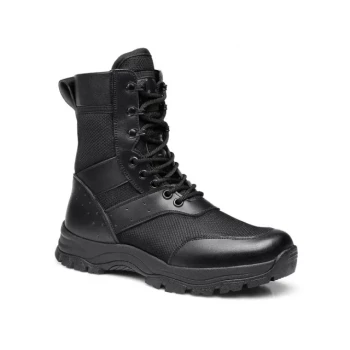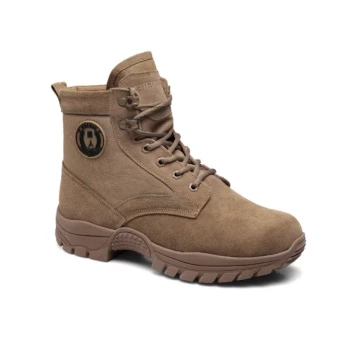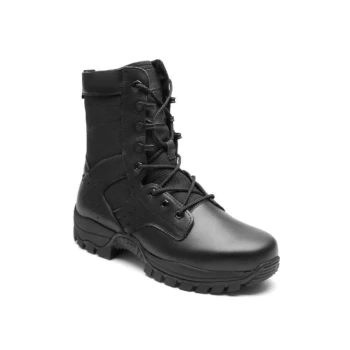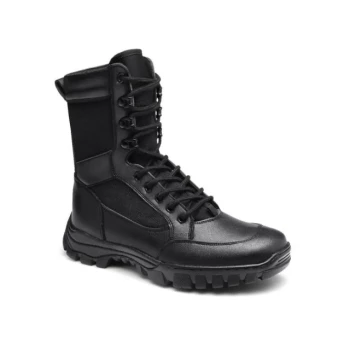I see the user wants to know about modern Wellington boot uses. My instinct is to give them a direct answer, of course, but also to show why these boots are still relevant in the first place. I need to make them understand the principles behind this design. I need to be a trusted advisor, not just a fact dispenser.
I'm thinking I'll start with a concise list of uses – heavy industry, agriculture, safety applications, and even fashion. I'll make sure to get right to the point!
The real power of the Wellington isn't just about keeping feet dry; it’s a platform that can be shaped to all sorts of modern challenges and it's all because of how adaptable they are.
Then, I'll dive into the core properties of the boot: how it's waterproof, protective, easy to maintain, and safe (mentioning the modern advances like steel toes and anti-static features). I’ll be sure to frame this around its adaptability and what makes it ideal for many situations.
I can't just list features, though. I need to discuss the tradeoffs – you know, how it might not be the best for long-distance walking because of its fit or how it can get a little sweaty because of the rubber. I'll need to be honest and realistic.
Finally, I'll wrap it up with some actionable advice. I'll make a bulleted list based on goals, like "everyday protection," "professional use," and "maximum safety." The goal is to empower the user to make an informed decision for their specific needs. That's the real value I can provide! In the modern era, Wellington boots have evolved far beyond simple rain protection. Today, their use cases span from critical safety equipment in heavy industry and agriculture to a practical staple for outdoor leisure and even a recurring feature in high fashion. Their core design has been adapted with advanced materials and reinforcements to meet the specific demands of countless environments.
The Wellington boot's enduring relevance comes not from what it is—a simple rubber boot—but from its role as a highly adaptable platform. Its fundamental waterproof and protective qualities can be enhanced with specialized features, making it a tailored solution for numerous modern challenges.
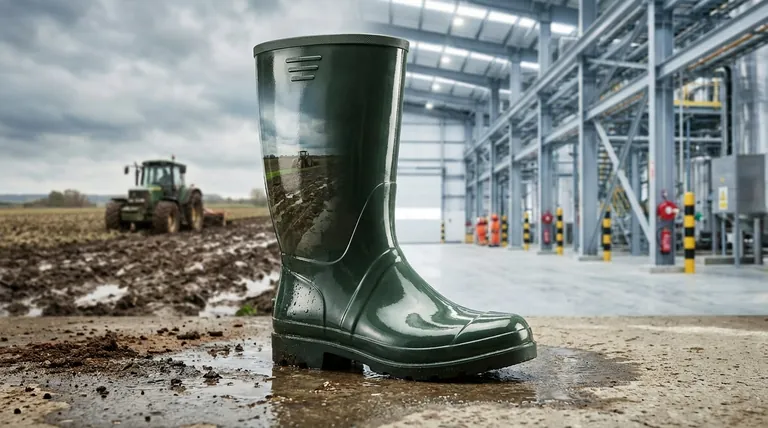
The Foundation: Core Design Principles
The boot's success in such varied applications is due to a few non-negotiable design characteristics that have remained constant.
Uncompromising Waterproofing
The primary advantage of the Wellington boot is its construction, traditionally from high-quality rubber. This material makes the boot completely impervious to water, mud, and many other liquids.
High-Shaft Protection
The tall design provides significant coverage for the lower leg. This protects the wearer not just from deep puddles but also from splashes, dirt, and potential chemical contact in industrial settings.
Ease of Maintenance
A key functional benefit is how simple the boot is to clean. A quick rinse is often all that is needed to remove mud and contaminants, a critical feature in agricultural, military, and industrial work.
Modern Evolution: From Puddles to Professional Hazards
While the core principles remain, the modern Wellington is a highly specialized tool. Its applications are best understood by how this core design has been augmented.
The Industrial and Agricultural Workhorse
In sectors like farming, fishing, and food processing, Wellingtons are essential daily equipment. Their durability, waterproof nature, and non-slip soles provide reliable performance on wet and unpredictable surfaces, from muddy fields to slick boat decks.
Advanced Safety Applications
Modern safety Wellingtons are highly engineered pieces of personal protective equipment (PPE). They are often reinforced with steel toes for impact protection and may include features like penetration-resistant midsoles, anti-static properties, and resistance to fuel and oil.
Specialized versions also offer thermal insulation for cold environments or heat protection for high-temperature work. This makes them a critical safety component in mining, construction, and chemical plants.
A Staple in Fashion and Leisure
Beyond professional use, the Wellington boot remains a cultural icon. It is a popular and practical choice for attendees of outdoor music festivals and has been adopted by fashion designers for seasonal collections, blending utility with style.
Understanding the Trade-offs
Despite their versatility, Wellington boots are a specialized tool with inherent limitations. Understanding these trade-offs is key to using them effectively.
Breathability vs. Waterproofing
The very feature that makes a Wellington boot waterproof—non-porous rubber—also means it is not breathable. This can lead to discomfort and sweat accumulation during prolonged wear or in warm conditions.
General Fit vs. Specialized Support
Traditional Wellingtons often have a looser fit designed for easy on-and-off. While comfortable for short-term use, they typically lack the ankle support and precise fit of a dedicated hiking or work boot, making them less suitable for long-distance walking over rough terrain.
Making the Right Choice for Your Goal
The ideal Wellington boot depends entirely on its intended application.
- If your primary focus is casual use and rain protection: A standard, unlined rubber Wellington provides excellent waterproofing and is easy to clean.
- If your primary focus is agricultural or outdoor work: Prioritize a boot with a durable, high-traction, non-slip sole and a comfortable cushioned insole for all-day wear.
- If your primary focus is safety in an industrial environment: You must select a certified safety Wellington with specific features like a steel toe, penetration resistance, or anti-static properties tailored to your workplace hazards.
Understanding these distinctions empowers you to select a tool perfectly suited to your specific needs.
Summary Table:
| Application | Key Features |
|---|---|
| Industrial & Safety | Steel toe, chemical resistance, anti-static, non-slip sole |
| Agriculture & Fishing | Waterproof, durable, easy to clean, high-traction sole |
| Fashion & Leisure | Stylish designs, festival-ready, practical for outdoor events |
| Specialized Uses | Thermal insulation, heat protection, penetration-resistant midsole |
Need a reliable manufacturing partner for your Wellington boot needs?
As a large-scale manufacturer, 3515 produces a comprehensive range of durable, waterproof, and safety-compliant footwear for distributors, brand owners, and bulk clients. Our production capabilities encompass all types of industrial, agricultural, and fashion-forward Wellington boots, tailored to your specific market requirements.
Contact us today to discuss your project and leverage our expertise in high-volume, quality footwear production.
Visual Guide
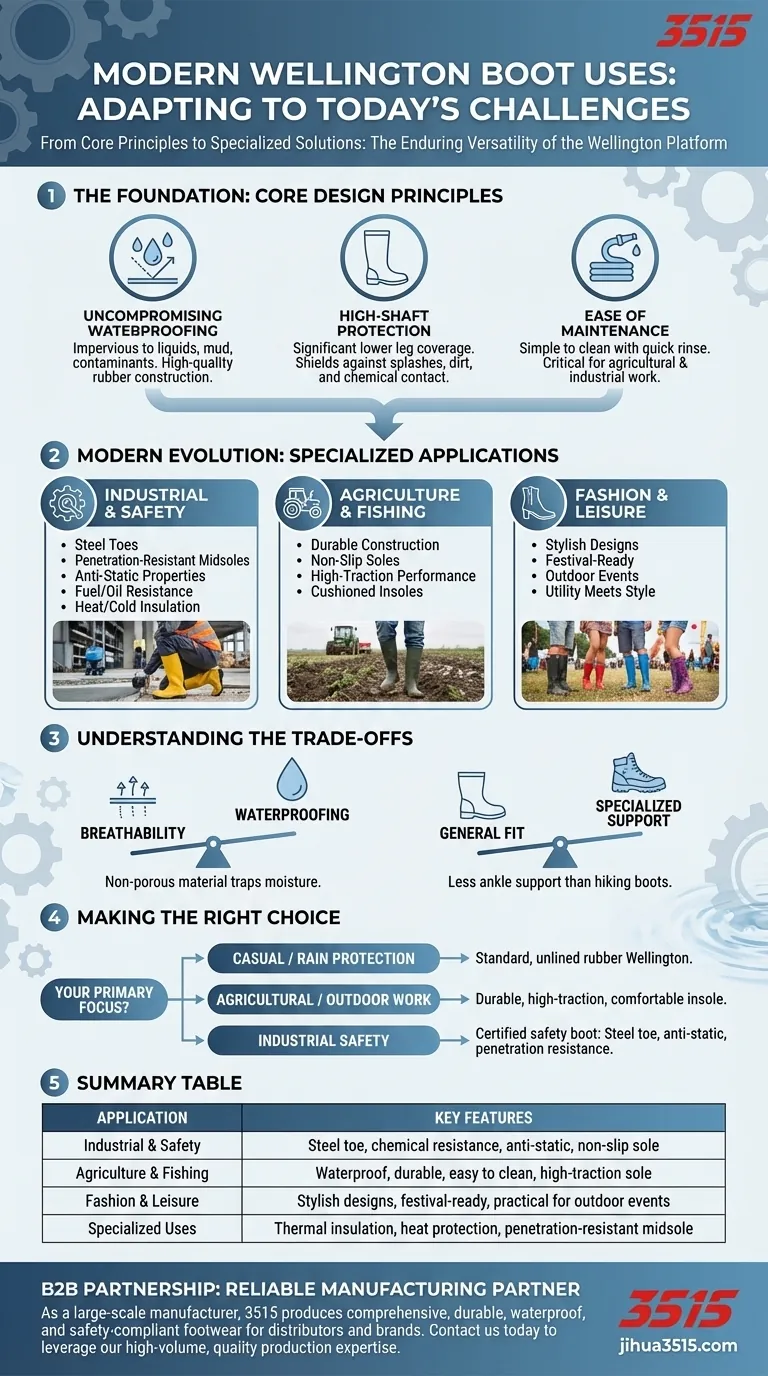
Related Products
- Safety Footwear Wholesale Manufacturer for Custom OEM/ODM Production
- Premium Flame-Retardant Waterproof Safety Boots and Shoes
- Factory-Direct Wholesale Canvas Boots with High-Traction Rubber Soles
- Wholesale Safety Footwear Manufacturer for Bulk & Custom OEM Orders
- High Performance Fire-Retardant Waterproof Safety Boots
People Also Ask
- What are some sustainable alternatives to traditional wellies? Eco-Friendly Options for a Greener Footprint
- What factors should be considered when choosing waterproof footwear? Find the Perfect Balance for Your Needs
- What are the drawbacks of rubber gardening shoes? Understanding the Trade-offs of Waterproof Footwear
- What options are available for men's gardening boots? Find the Perfect Fit for Your Garden's Needs
- Is it advisable to manually stretch children's wellies? Protect Your Child's Foot Health and Boot Integrity
- What features should the best wellington boots provide? A Guide to Material, Lining & Sole
- What are the main uses of Wellington boots? From Industrial Safety to Everyday Protection
- What is vulcanization and why is it important in gumboot manufacturing? Unlock Superior Durability & Performance















